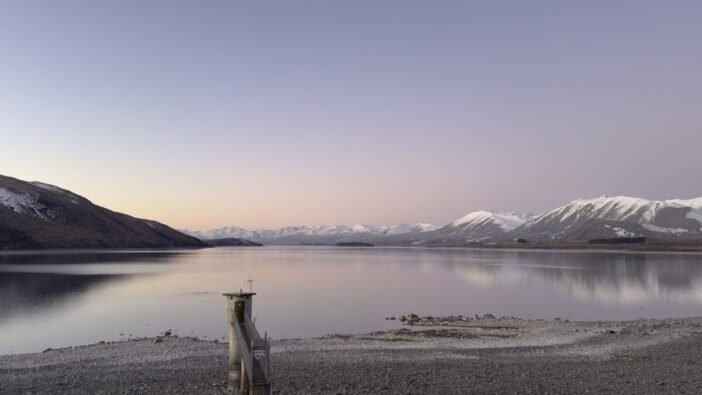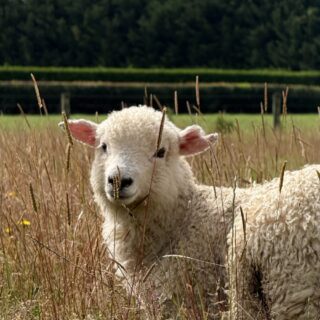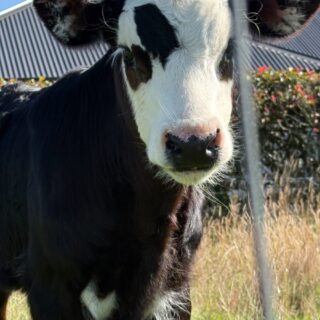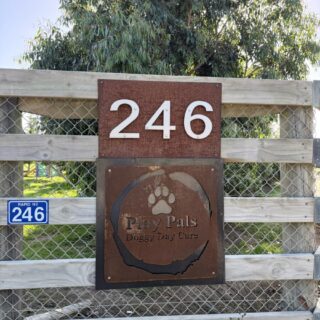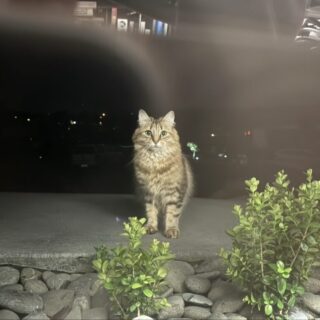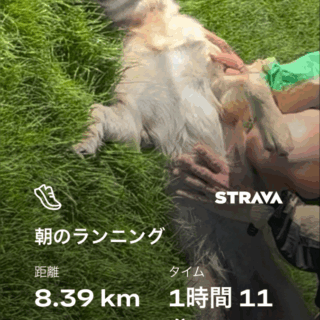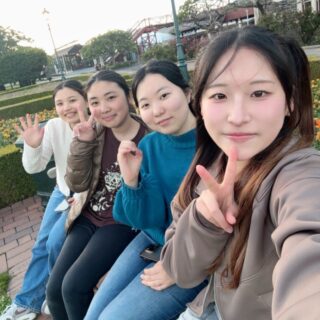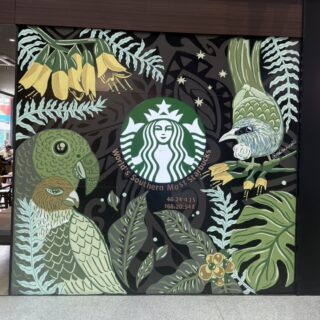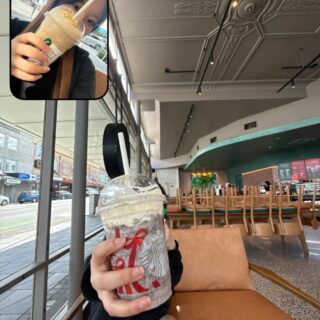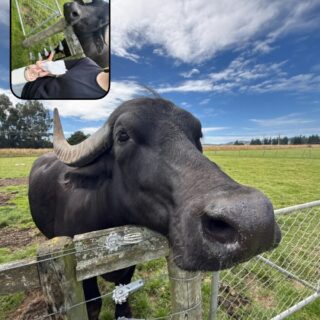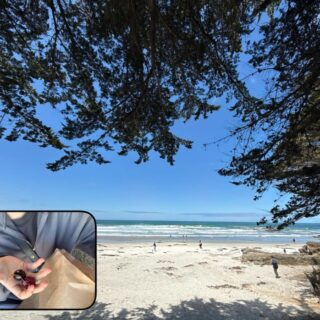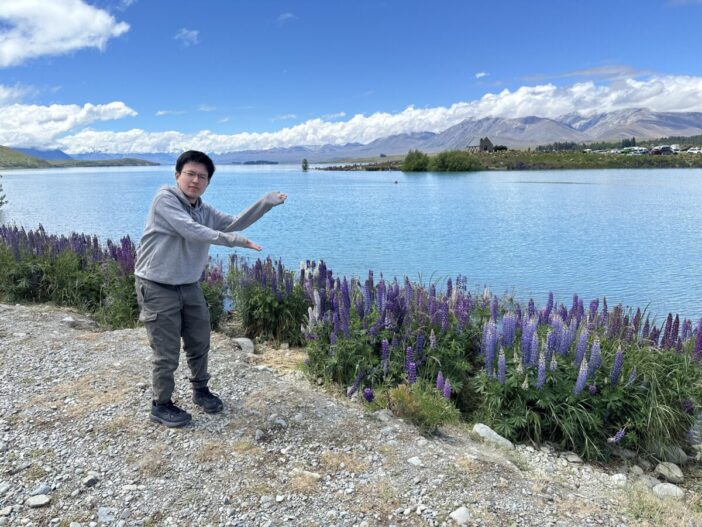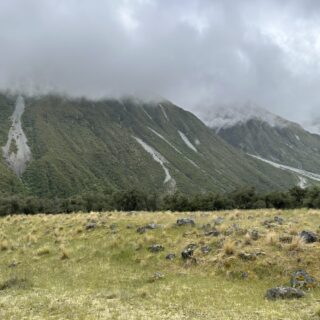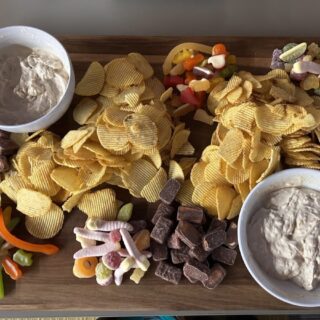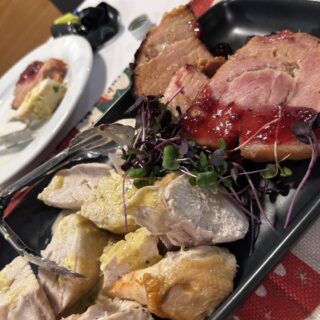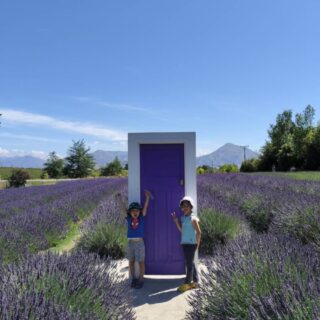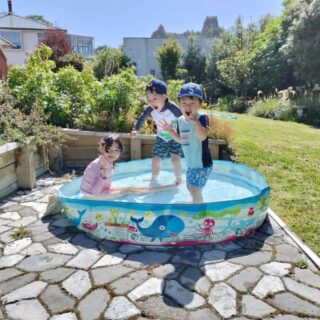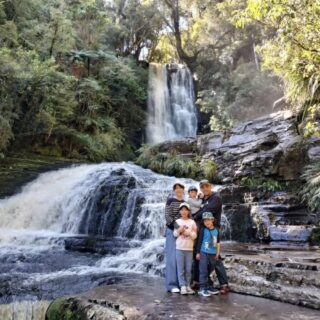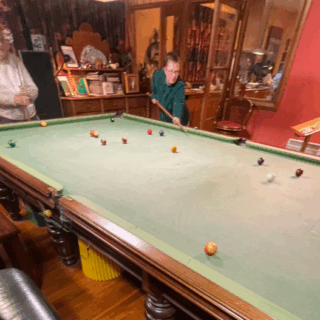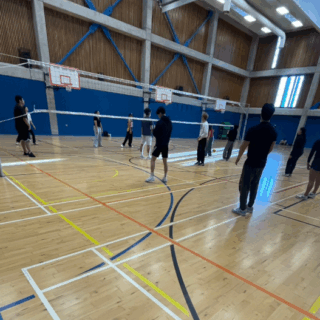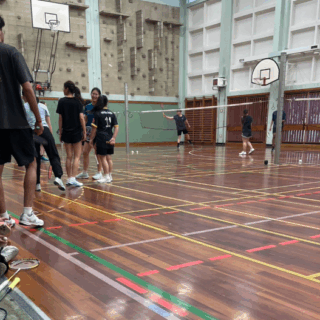New Zealand
ニュージーランド
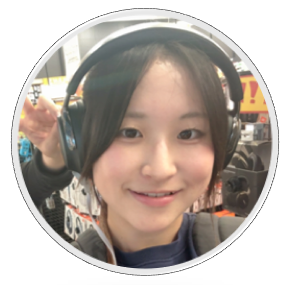 ICTジャーナルをご覧の皆様、3年生の高田 星奈です。ついこの間まで、ニュージーランドに来てから何か月、と数えていたものが、帰国まで何か月と数えるほうが早い時期になってしまいました。
ICTジャーナルをご覧の皆様、3年生の高田 星奈です。ついこの間まで、ニュージーランドに来てから何か月、と数えていたものが、帰国まで何か月と数えるほうが早い時期になってしまいました。
今回のジャーナルでは、留学中の出来事を振り返ります。是非、ICTに入学を考えている方やこれから留学を控えている方々に、現地での生活の雰囲気が少しでも伝われば嬉しいです。
まず初めに、私たちが留学しているダニーデンは小さい街ですが、海にも山(丘)にもアクセスが良く、日常的に大自然を感じられます。天気の良い日にはビーチでランニングし、その後眺めの良い高台からダニーデンを一望することができます。特別な観光をしなくても、日常の中に豊かな景色があるのが、この街の良さですね。
そんな日々を過ごしながら、少し足を伸ばせば南島ならではの絶景にも出会えます。2025年8月には日本から来ていた家族と南島を代表する観光地、レイク・テカポ(Lake Tekapo)に行きました。到着してすぐ、辺りは静けさと透明な空気に包まれました。湖の周りにはいくつかの飲食店やキッチンカーがあるので、景色と一緒に楽しむことができます。特に評判の良かったキッチンカーのフィッシュ・アンド・チップスを購入しましたが、これがとても美味しかったです。刻一刻と変化する湖面の色に、黄金色のフィッシュ・アンド・チップスがよく映えました。星自体はホームステイ先からも見えるのですが、レイク・テカポから見る星空も、家から見る星空も、どちらも比べ物にならないほど素晴らしく、本当に満天の星空でした。(満点⭐)
余談ですが、星の撮影にはiPhone 16 proを使用しています。素人からすると、申し分ない画質です。そして、時期によってはレイク・テカポからオーロラを見ることができるそうなので、その時期を狙うことをおすすめします。
レイク・テカポ ふれあい動物園
ニュージーランドといえば羊というイメージがありますが、その印象はダニーデン空港に到着して間もなく実感しました。車で走っていると牧草地のあちこちに羊がいて、こちらをじっと見ていることもあります。ただ、羊だけが目立つ一方で、実際は羊以外にも多種多様な生物と共存している豊かな国なのです。ほとんどの家庭が犬を家族として迎え入れ、猫を放し飼いにし、庭では野生のハリネズミがくつろいでいるような場所です。
庭で睡眠中のハリネズミ。子供の声に驚く。
こうした生活にも慣れてきた1月末には、ダニーデンから車で20分ほどのところにあるモスギールという場所で、ファームステイを体験しました。ファームステイとは、農場に泊まりながら、そこで暮らす人たちの生活を体験する滞在スタイルです。その実態は、日本では経験できないような非日常感にあふれており、特に私は生まれも育ちも東京なので、自分が経験してきたこととのギャップを強く感じました。
朝はベッドから羊と牛、そして侵入してきたウサギまでもが見える景色で始まります。この体験は一生忘れません。社会復帰が難しいほど、幸福度が高すぎたのです。広大な農場に広がる青々とした牧草には、草と土の匂いが凝縮されているようでした。
幸運にも、オーナーさんが普段からされている作業を見学させてもらえることになり、牛がいるエリアまで、トラクターに乗って向かいました。さらに、牧羊犬が仕事をしている姿も見ることができたのですが、間近で見るのは初めてで、特に印象に残っています。オーナーさんの合図に忠実な牧羊犬の様子からは、日ごろの訓練の積み重ねが伝わってきました。
牛と話す牧羊犬のSuu
羊を集めるSuu
そして、宿泊場所から徒歩1時間程度の急斜面の丘を越えた先には、ペットの犬の一時預かり施設があったので、興味本位で話を聞きに行きました。広い敷地内には、15匹ほどの犬が自由に走り回れる環境が整っています。オーナーさんは、飼い主が仕事の間に犬を一時的に預かるサービスを行っており、とても気さくな方でした。
犬用のプレイグラウンドは、まるで遊園地のようで、毎日遊びに来られるとなったら本当に夢がありますね。さまざまな犬と仲良くなれた気がします。聞いたところ、犬の世界には序列があるそうで、群れを率いる“α(アルファ)”と呼ばれる存在を間近で見ることができて、思わず興奮してしまいました。犬同士(特に大型犬)が集まっている様子をあまり見かけないので、とても興味深かったです。
さらに、母親と離れてしまった子鹿も保護しているようで、囲いの中で生まれていた小さな生態系には、どこかミニチュアのような面白さがありました。
そして最後に、留学生活を語るうえで欠かせないのがホストファミリーの存在です。ホストファミリーによっては、車でお出かけに連れて行ってもらえることもあります。フィジー出身である私の元ホストファミリー(事情があり変更となったホストファミリー)は、私を深夜3時に起こし、ダニーデンから車で南島の最北部にあるネルソン(日本で例えると金沢から鹿児島の距離に相当します)に連れていってくれました。彼らは車の窓から洋ナシの芯を投げながら「コンポスト‼」と叫ぶようなロックな方々でした。なかなかワイルドでしたが、良い思い出です。ご縁があり、10軒ほどの家を訪問する機会がありましたが、場所と人によって生活が180度違うので、精神的にも鍛えられたと思います。
このように、留学中は日本では味わえないような文化を体験することが醍醐味だと感じています。良し悪しはさておき、自分の固定観念を見つめ直す機会を得ることができました。日本にいるうちから夢中になれるものを見つけておくと良いかもしれません。
長くなりましたが、最後までご覧いただきありがとうございました。
高田 星奈
-
With friends before New Year’s Eve年越し前に友人と共に
-
The southernmost Starbucks in the world世界最南端のスターバックス
-
Starbucks in central Dunedinダニーデン中心地のスターバックス
 Hello everyone, and thank you for reading the ICT Journal. My name is Sena Takada, and I am a 3rd year student. Until recently, I used to count how many months it had been since I arrived in New Zealand—but now it feels faster to count how many months are left until I return to Japan.
Hello everyone, and thank you for reading the ICT Journal. My name is Sena Takada, and I am a 3rd year student. Until recently, I used to count how many months it had been since I arrived in New Zealand—but now it feels faster to count how many months are left until I return to Japan.
In this journal, I would like to look back on some of my experiences during my study abroad. I hope this gives those who are considering applying to ICT even a small sense of what everyday life here feels like.
First, Dunedin, where we are currently studying, is a small city. However, it has great access to both the ocean and the hills (or mountains), so you can feel close to nature in your daily life. On a sunny day, you can go for a run on the beach and then enjoy a panoramic view of Dunedin from a scenic lookout. One of the best things about this city is that even without doing anything “touristy,” you can still find rich and beautiful scenery as part of ordinary life.
While living these kinds of days, if you travel just a little farther, you can also encounter the spectacular landscapes that represent the South Island. Around August 2025, I visited Lake Tekapo, one of the major tourist spots on the South Island, with my family who had come from Japan. As soon as we arrived, the area felt wrapped in silence and crystal-clear air. There are several restaurants and food trucks around the lake, so you can enjoy the scenery along with something to eat. We bought fish and chips from a particularly well-reviewed food truck, and it was delicious. The golden fish and chips looked perfect against the lake’s surface, whose colors kept changing from moment to moment. You can see stars from my homestay as well, but the starlit sky at Lake Tekapo—and even the stars seen from home—were both so beautiful that they were beyond comparison. It truly felt like a sky full of stars. (A perfect score ⭐)
As a side note, I use an iPhone 16 Pro to take photos of the stars. From a beginner’s perspective, the image quality is more than enough. Also, depending on the season, it seems that you may be able to see the aurora from Lake Tekapo, so I recommend aiming for that as well.
Lake Tekapo Petting Zoo
Next, many people associate New Zealand with sheep, and it didn’t take long after arriving at Dunedin Airport for me to understand why. When you drive around, you can see sheep scattered across the grasslands, and sometimes they even stare back at you. However, even though sheep stand out the most, this country is rich in biodiversity and is home to many different kinds of animals. In most households, dogs are welcomed as family members, cats are often allowed to roam freely, and in some gardens, wild hedgehogs relax as if they actually live there. That’s the kind of place it is.
Sleeping hedgehog in the garden, startled by children
By the end of January, once I had gotten used to this lifestyle, I experienced a farm stay in a place called Mosgiel, about a 20-minute drive from Dunedin. A farm stay is a style of travel where you stay on a farm and experience the daily life of the people who live and work there. It was full of “non everyday” experiences that you could never have in Japan. Since I was born and raised in Tokyo, I felt a strong contrast between what I had grown up with and what I was experiencing there.
My mornings began with the view from my bed—sheep, cows, and even an “invading” rabbit in the distance. I will never forget this experience. My happiness level was so high that returning to normal society felt difficult. Across the vast farm, the deep green pasture seemed to carry a concentrated scent of grass and soil. Luckily, the owner let us observe the work they normally do, and we rode a tractor out to where the cows were. I also got to see a sheepdog working up close for the first time, which left a strong impression on me. From the way the dog responded faithfully to the owner’s signals, I could feel the accumulation of daily training.
Suu the sheepdog and the cows
Suu gathering the sheep
Then, about an hour’s walk from where we stayed—past a steep hillside—there was a dog daycare facility for temporary pet boarding, so I went there out of curiosity to ask about it. It was a spacious property where about fifteen dogs could run around freely. The owner offered temporary care while owners were at work, and they were very friendly. The dogs’ playground felt like an amusement park, and honestly, it felt like a dream if I could come and play there every day. I felt like I became friends with many of the dogs.
I had heard that there is a kind of “hierarchy” in dog society, and I was thrilled to see an alpha leading the group up close. Since I rarely see so many dogs (especially large dogs) gathered together, it was fascinating. It also seemed that they were protecting a fawn that had been separated from its mother, and the little ecosystem inside the enclosure felt like its own miniature world.
Finally, one essential part of studying abroad is the host family. Depending on the family, they may even take you on trips by car. My former host family (I had to change families due to circumstances), who are Fijian, once woke me up at 3:00 a.m. and drove me from Dunedin to Nelson at the very top of the South Island (roughly equivalent to the distance from Kanazawa to Kagoshima in Japan). They were the kind of wild people who would throw pear cores out the car window while yelling, “Compost!!” They were intense, but it is a great memory. I had the chance to visit around ten different homes, and because daily life can be completely different depending on the place and the people, I think it strengthened me mentally.
In this way, I believe one of the best parts of studying abroad is experiencing cultures that you cannot truly taste in Japan. Whether good or bad, I was given the chance to re-examine my own assumptions and fixed ideas. It may be a good idea to find something you can become deeply passionate about while you are still in Japan.
This became quite long, but thank you very much for reading.
Sena Takada
-
With friends before New Year’s Eve年越し前に友人と共に
-
The southernmost Starbucks in the world世界最南端のスターバックス
-
Starbucks in central Dunedinダニーデン中心地のスターバックス
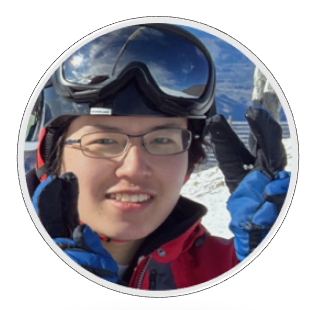 清少納言は、現代の冬をどう楽しんだでしょうか。雪の降る早朝が懐かしく、遠く感じる、令和7回目の師走でした。 あけましておめでとうございます。先月、日本に帰ってまいりました、3年の鴨下麟太郎です。 ニュージーランドのリーサル紫外線にようやく別れを告げたかと思えば、信州の身も心も温度計も凍る冬に耐える日々に、むしろ落ち着きを覚える今日この頃です。
清少納言は、現代の冬をどう楽しんだでしょうか。雪の降る早朝が懐かしく、遠く感じる、令和7回目の師走でした。 あけましておめでとうございます。先月、日本に帰ってまいりました、3年の鴨下麟太郎です。 ニュージーランドのリーサル紫外線にようやく別れを告げたかと思えば、信州の身も心も温度計も凍る冬に耐える日々に、むしろ落ち着きを覚える今日この頃です。
さて、実は私、帰国前に2週間の家族旅行に行ってまいりました。ダニーデンを離れ、南島の自然という自然を貪り尽くす豪快な旅。今回は、そんな家族3人での初めての海外旅行記をご紹介していこうと思います。ニュージーランドの壮大華麗な魅力を、この小さなディスプレイの中で感じていただければ嬉しいです。
物語は、我々3年生が暮らす学園都市、ダニーデンから始まります。ニュージーランドに到着後、慣れない土地に惑わされる我が両親を道案内し、方向音痴は8ヶ月もいれば解決することを見せつけます。父の要望により、私がこの8ヶ月、毎日学びを深めたこの都市を肌で感じたいということで、我々家族はダニーデンに5泊もすることとなります。ここで私は両親に、散歩コースとして幾度となく訪れたSt Clair Beach、足しげく通い国際交流をひたすらに深めたカードショップ、そして8か月間、完全に自身の縄張りにしていたOtago Polytechnicのキャンパスなど、様々な場所を案内しました。また、父と一緒にダニーデン中のコーヒーショップを回り、飲み比べをしました。ニュージーランドのコーヒーはかなり癖が少なく、飲みやすく、非常にレベルが高いです。日本では飲むことができず、ニュージーランドに来てから飲めるようになったクラスメイトもいるくらいです。皆さんが来訪する際は、一度試してみてはいかがでしょうか。
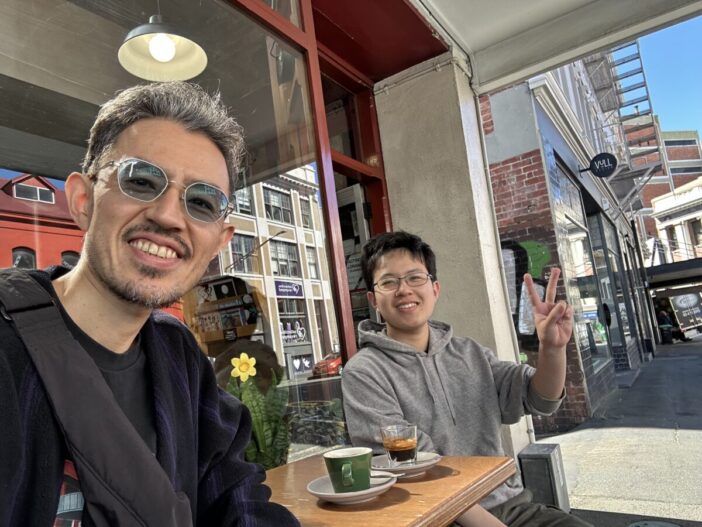
My father (on the left) and I (on the right), sipping coffee in the suburbs of Dunedin.ダニーデン郊外にてコーヒーを嗜む父(左)と私(右)
ダニーデンでの日々が終わると、我々が次に向かったのはLake Tekapo。ニュージーランド有数の面積を誇る氷河湖で、運転いただいたドライバーの方によると、Tekapoは「夜」という意味が含まれるマオリ語で、星空が美しいLake Tekapoの特徴を表現しているのではないかと言われているそうです。このとき、私は完全にこのTekapoの星空を見ることが旅の目的で、運転は移動手段と考えていました。ところが、道中でその予想を大きく超える体験をしました。ドライバーは日本人の方だったのですが、この人のお話のうまいこと。もちろん、道中の景色が非常に美しかったというのもありますが、それにしてもお話が巧みで、私は終始、その方のニュージーランドトークに心を奪われてしまいました。その方のルートも完璧で、定番の海沿いではなく山道を走ってくださったのですが、広大な(それはもう広大な)自然が永遠に続く景色は、「ミッション・インポッシブルのあれって、嘘じゃなかったんだ」と思わせる広大さは想像以上で、5時間ほどの時間が矢のごとく過ぎ去っていきました。
Tekapoに着くと、あまりの広さと水色さに、自分の常識が壊されすぎて、1日目は完全に見惚れただけで終わってしまいました。しかし、本旅行のメインイベント「本物の天の川を見る」。これだけは、絶対に逃してはいけないという思いでした。天気的にも、1日目が唯一のチャンスと宣告される中、移動疲れなど問答無用で、翌日早朝2時、文明の利器の振動を用いて強引に眼を開きます。このとき、半睡状態でゆっくりと外に出た私の目に、無数の光の粒が飛び込んでくる感覚を、今でも覚えています。この時見た星空の美しさを文章に書くことは一生ないと思います。心から、自身の眼で見ていただきたい。ただ、一つだけ。私はその瞬間、「ああ、この星空を見るために、私は両の眼を授かったのだな」。そう思いました。
星空に圧倒され、2日目3日目ともに悠々と過ごし、Tekapoでの生活を堪能し終えると、我々は最後の自然の名所旧跡としてMt Cook(Aoraki)を訪れます。Mt Cookは国立公園に指定されているほど、貴重な自然が集まる場所です。ここで私たちは軽いハイキングコースを2本ほど歩かせていただきました。この日は大変な曇りで、山頂に雲がかかってよく見えず、少し落胆していました。しかし、ドライバーさんのご説明によると、Aorakiは雲に関係する単語だそうで、雲の神と大地の神が引き離された神話のお話など、たくさんのマオリ文化のお話を聞かせていただきました。おかげで、最悪と思われた曇天模様は、むしろ神秘的に感じることができました。
この後、我々はクイーンズタウンへと送っていただき、オークランドに到着、最後の買い物や、外食を済ませ、この長い旅に幕を下ろしました。
-
Aoraki kissed by the clouds雲にキスされるAoraki
-
The gluten-free burger I had in Auckland was amazing…!オークランドで食べたグルテンフリーハンバーガー、 絶品でした!
このジャーナルで、私が伝えたかったことは大きく3つ。1つ目は、こういった旅行というのは、学生にとってはダニーデンにとどまらずニュージーランドの知見を広げるため、家族にとっては学生と共にダニーデンやその他の広大な自然とのふれあいを通して感覚を共有するため、という深い意義があり、今後に留学を控えた1、2年生や新入生などは特に、ぜひこういった機会について考えてほしいということ。
2つ目は、文章にて再三触れさせていただいた、ダニーデンからクイーンズタウンまでお世話になったTekapo Shuttleさんがとにかく素晴らしく、行く際にはぜひ利用してほしいということ。ちなみに、Tekapo Shuttleのオーナーさんの名前がRintaroで、由来も同じなのに漢字が違うという偶然の一致に驚いたのが、この旅で一番の印象的な出来事でした。
そして最後に、Lake Tekapoの星空は、本当に見ていただきたいということです。
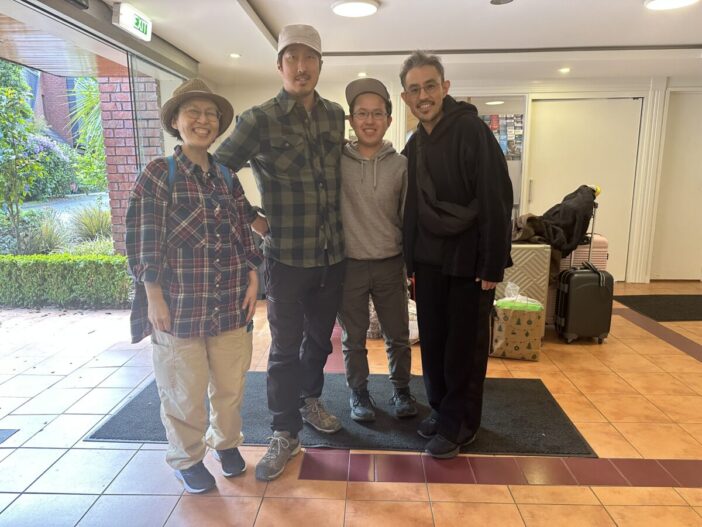
The absolutely incredible owner of Tekapo Shuttle, Rintaro (second from the left), with my family.あまりにも最高すぎたTekapo Shuttleのオーナー、Rintaroさん(左から2番目)と我が家
我々ももうすぐこの3年生が終わり、国際高専生活も半分を超しました。人生くんの足早さには、日々驚愕させられるものです。毎日全力疾走の日々もいいかと思いますが、たまには少し足を止めて、大自然に体ごと傾けてみても良いのではないでしょうか。
本年も、皆様にとって実りある年となることを心からお祈りしております。
それでは、また。
鴨下 麟太郎
 How, I wonder, would Sei Shōnagon have enjoyed winter if she were alive today?
How, I wonder, would Sei Shōnagon have enjoyed winter if she were alive today?
In this 7th December of the Reiwa era, the snow-filled early mornings feel at once nostalgic and impossibly distant.
Happy New Year. This is Rintaro Kamoshita, a 3rd year student. I returned to Japan last month.
Just as I thought I had finally parted ways with New Zealand’s lethal ultraviolet rays, I now find myself enduring the winters of Shinshu, where body, mind, and thermometer alike freeze solid. Strangely enough, there is a sense of calm in these days.
Before returning home, my family joined me in New Zealand, and together we embarked on a two-week adventure. Leaving Dunedin behind, we set out on a bold journey that explored every corner of the South Island’s natural beauty. In this journal, I would like to share the story of our very first overseas family trip, taken by the three of us. I hope that, through this small glimpse, you can feel the grandeur and magnificence of New Zealand.
Our story begins in Dunedin, the academic city where we 3rd year students live. After arriving in New Zealand, I guided my parents—bewildered by the unfamiliar land—and proudly demonstrated that even a terrible sense of direction can be cured after eight months. At my father’s request, wanting to truly feel the city I had spent those months learning from every day, we decided to stay in Dunedin for a full five nights.
During that time, I showed my parents many places dear to me: St Clair Beach, which I had visited countless times on walks; the card shop where I deepened international friendships through frequent visits, and the Otago Polytechnic campus, which I had completely claimed as my own territory over the past eight months. I also went around Dunedin’s many coffee shops with my father, comparing cup after cup. New Zealand coffee is remarkably smooth, easy to drink, and of an exceptionally high standard. Some classmates of mine only learned to enjoy coffee after coming to New Zealand. If you ever visit, I highly recommend giving it a try.

My father (on the left) and I (on the right), sipping coffee in the suburbs of Dunedin.ダニーデン郊外にてコーヒーを嗜む父(左)と私(右)
Once our days in Dunedin came to an end, our next destination was Lake Tekapo. One of New Zealand’s largest glacial lakes, Tekapo is said—according to our driver—to derive from a Māori word containing the meaning “night,” perhaps reflecting the lake’s famously beautiful starry skies. At that point, my sole purpose for the journey was seeing the stars of Tekapo; driving was merely a means of transport. That assumption was completely overturned along the way.
Our driver, a Japanese man, was an incredible storyteller. Of course, the scenery alone was more than enough to amaze us, but his New Zealand stories held my attention from start to finish. His choice of route was also perfect—rather than the standard coastal road, he took us through the mountains. The vastness—no, the overwhelming vastness—of nature stretching endlessly before us made me think, “So the scenery in Mission: Impossible wasn’t an exaggeration after all.” The five-hour journey passed like an arrow in flight.
Upon arriving in Tekapo, the sheer scale and surreal turquoise color of the lake shattered my sense of normalcy, and the first day ended with us doing little more than staring in awe. But the main event of this trip—seeing the real Milky Way—was something I absolutely could not miss. With the weather forecast declaring that the first night would be our only chance, fatigue was dismissed without negotiation. At 2 a.m. the next morning, I forced my eyes open using the vibrations of modern technology.
Even now, I remember the sensation of stepping outside half-asleep and having countless particles of light rush into my vision. I do not think I will ever attempt to describe the beauty of that night sky in words. I want you to see it with your own eyes. I will say only this: in that moment, I thought, “Ah—this is why I was given these eyes.”
After being utterly overwhelmed by the stars, we spent our second and third days in Tekapo at an unhurried pace, savoring life there. Then, as the final great natural landmark of our journey, we visited Mt. Cook (Aoraki). Designated as a national park, it is a place where precious natural wonders gather in abundance. We walked two relatively gentle hiking trails that day.
The weather was heavily overcast, and the summit was hidden behind clouds, which initially disappointed us. However, our driver explained that “Aoraki” is a word related to clouds, and he told us Māori legends, including the story of the cloud god and the earth god being torn apart. Thanks to those stories, what could have been the worst possible weather instead felt deeply mystical.
After this, we were taken to Queenstown, then flew on to Auckland, where we did our final shopping and dining before bringing this long journey to a close.
-
Aoraki kissed by the clouds雲にキスされるAoraki
-
The gluten-free burger I had in Auckland was amazing…!オークランドで食べたグルテンフリーハンバーガー、 絶品でした!
There are three main things I wanted to convey through this journal.
First, trips like this hold deep significance: for students, they broaden one’s understanding of New Zealand beyond Dunedin; for families, they allow shared experiences and sensations through time spent together in Dunedin and amidst vast natural landscapes. For 1st and 2nd year students, as well as new arrivals planning to study abroad, I especially hope you will consider opportunities like this.
Second, Tekapo Shuttle, who took care of us from Dunedin to Queenstown, was absolutely outstanding. If you go, I strongly recommend using their service. By the way, the biggest surprise of this trip was discovering that the owner of Tekapo Shuttle is also named Rintaro—and even shares the same name origin as me, though written with different kanji. What an incredible near miss!
And finally—seriously—go see the stars at Lake Tekapo.

The absolutely incredible owner of Tekapo Shuttle, Rintaro (second from the left), with my family.あまりにも最高すぎたTekapo Shuttleのオーナー、Rintaroさん(左から2番目)と我が家
Before long, our 3rd year will come to an end, and our time at ICT will be more than halfway over. The speed at which life moves continues to astonish me. Living every day at a full sprint is not a bad thing—but perhaps, once in a while, it is good to stop, and lean your whole body into the vastness of nature.
I sincerely wish that this year will be a fruitful one for all of you. Until next time.
Until next time.
Rintaro Kamoshita
 こんにちは。
こんにちは。
ニュージーランドのダニーデンにあるオタゴ・ポリテクニクにて職員研修留学をしている南戸です。普段は国際高等専門学校・金沢キャンパスで職員として勤務していますが、現在は夫と11歳の長女、5歳の長男とともに、10か月間の研修留学でニュージーランドに滞在しています。こちらでは、オタゴ・ポリテクニクの校舎でイベントマネジメントを専攻し、授業を受けながら、実務体験やインターンシップを通じて、現地の方々と一緒に働く貴重な経験をさせていただいています。
平日は授業の後、現地の小学校に通う子どもたちを迎えに行き、週末にはダニーデンの山や海、博物館、美術館、公園など、さまざまな場所を訪れています。また、イベントのボランティアなど地域のコミュニティにも積極的に参加し、現地の人々との交流を楽しみながら、家族で充実した時間を過ごしています。
今回は、ニュージーランドでの生活の中で出会った、現地ならではの食べ物をご紹介します。これから入学を控えている方や留学を予定している学生の皆さん、そしてそのご家族の方々に向けて、ニュージーランドの食文化を少しでも知っていただき、現地に行った際に「楽しそう!」「食べてみたい!」と思っていただけるような内容をお届けできればと思います。
まずはフェアリーブレッド(Fairy Bread・妖精のパン)です。これは子どもの誕生日会では定番のメニューで、食パンにマーガリンを塗り、その上にアイスクリーム用のカラフルなトッピング(スプリンクル)を散らした手作りのお菓子です。味は想像通り甘く、ザラザラとした食感が特徴ですが、子どもたちは大喜びでした。レシピはインターン先で子供たちのお誕生会を開く機会があり、その際に勤務先のダニーデン育ちのミカエラさんに教えていただきました。
そして、定番のスナックといえばこちら。ポテトチップスには「キウイオニオンディップ(Kiwi Onion Dip)」をつけて食べるのがニュージーランド流です。このディップは、NestléのReduced Cream(缶入り無糖クリーム)にオニオンスープの素(粉末)を混ぜるだけで簡単に作れます。特にソルト&ビネガー味のポテトチップスとの相性は抜群で、一度食べたら止まらない、永遠に食べ続けたくなるような中毒性のある美味しさです。
ニュージーランドでは、キャンディ全般を「ロリー(lolly)」と総称し、子どもから大人まで親しまれています。この写真に写っているのは、カラフルで細長いグミのようなロリー、そして「パイナップル・ランプス(Pineapple Lumps)」と呼ばれる、チョコレートでコーティングされたパイナップル味のソフトキャンディです。どちらもニュージーランドを代表するお菓子で、特にパイナップル・ランプスは“国民的おやつ”として長年愛されています。こちらも一度食べ出したらやめられないおいしさです。
こちらは「チーズロール」と呼ばれる、どのカフェでも見かける定番メニューで、比較的お手頃な価格で楽しめるのも魅力のひとつです。白いパンで作ったものもあります。ニュージーランド、特に南島で親しまれているソウルフードとして知られています。その正体はというと、薄切りの食パンにチーズフィリングを塗り、くるくると巻いてトーストしたもの。仕上げにたっぷりのバターを塗って頬張れば、思わず笑みがこぼれる“幸せの味”が広がります。
こちらはクリスマス料理の一例です。ニュージーランドでは真夏の8月に「ミッドウインター・クリスマス」と称して、クリスマスディナーを囲む家庭が多くあります。私もご縁があり、インターンシップ先のクリスマスディナーに参加させていただきました。食事はサラダやパンの前菜から始まり、メインにはポークやチキンのハムに、ローストしたお芋が添えられていました。このオレンジ色のお芋は「クマラ(Kumara)」と呼ばれ、ニュージーランドで広く親しまれている、さつまいもに似た野菜です。スーパーマーケットでもよく見かけ、焼き芋にすると絶品。我が家でも人気の食材でした。デザートには、ニュージーランド発祥とされる「パブロバ(Pavlova)」が登場。メレンゲをベースにした伝統的なスイーツで、外はサクサク、中はふんわりとした食感が特徴です。たっぷりの生クリームと季節のフルーツをのせて楽しむ、特別な日のデザートとして親しまれており、日本人にもなじみやすい味わいでした。
-
Roast ham and creamy chicken served with cranberry sauceローストハムとクリーミーチキンのクランベリーソース添え
-
Pavlova – a classic Christmas dessert in New Zealandパブロバというクリスマスに定番のデザート菓子
カフェに行くと、多くの人が飲んでいるのが「フラットホワイト(Flat White)」というコーヒーです。これは、エスプレッソにきめの細かいスチームミルクを加えたミルク入りコーヒーで、地元では定番の一杯として親しまれています。カフェラテよりもミルクの量が少なく、コーヒーの苦みや風味をしっかりと味わえるのが特徴かと思います。ニュージーランドのカフェを訪れた際には、ぜひ一度試してみてはいかがでしょうか。
ニュージーランドでの生活は、自然の豊かさや人々の温かさに触れる毎日です。食文化もその一部として、私たち家族にたくさんの驚きと楽しさを与えてくれています。この記事がこれから留学を考えている方やそのご家族の皆さんにとって、少しでも現地の暮らしが身近に感じられるきっかけになれば嬉しいです。そして、ニュージーランドの味を通して、皆さんの留学生活がより豊かで楽しいものになりますように願っています。
南戸 仁美
 Hello,
Hello,
My name is Hitomi, and I am currently on a one-year Sabbatical Training program at Otago Polytechnic in Dunedin, New Zealand. Usually, I work as an ICT staff member at the Kanazawa Campus. Now, I’m here in New Zealand with my husband, our 11-year-old daughter, and our 5-year-old son. At Otago Polytechnic, I’m studying Event Management, attending classes, and gaining practical experience through several projects and internships. These opportunities allow me to work alongside local staff and learn directly from the New Zealand work environment.
After classes on weekdays, I pick up my children from their local primary school. On weekends, our family enjoys exploring the natural beauty of Dunedin, its mountains, beaches, museums, arts, parks, and more. We also actively participate and volunteer in local community events, which have provided us with wonderful opportunities to connect with people and enrich our experience here.
In this report, I’d like to introduce some of the unique foods I’ve experienced during our stay. I hope this gives future students, their families, and anyone preparing to study abroad a glimpse into New Zealand’s food culture.
Let me start with “Fairy Bread”, a popular menu item at children’s birthday parties in New Zealand. It’s made by spreading margarine on slices of white bread and sprinkling colorful ice cream toppings (sprinkles) on top. As you can imagine, it’s sweet and crunchy, and the kids absolutely loved it. I learned the recipe from Mikayla, one of the supervisors at my internship, who’s a Dunedin local.
The next one is a classic Kiwi snack, potato chips with Kiwi Onion Dip. This dip is easy to make; just mix Nestlé’s reduced cream (a canned unsweetened cream) with powdered onion soup mix. It tastes very good, especially with salt and vinegar flavor chips, and is highly addictive. Once you start, it’s hard to stop! In New Zealand, all kinds of candy are affectionately called “Lollies”, and they’re loved by both kids and adults. In the photo, you can see colorful, chewy gummy lollies and Pineapple Lumps. These are soft pineapple-flavored candies coated in chocolate, and they’re so delicious you’ll find it hard to eat just one.
The “cheese roll” is a popular snack you can find in almost any café. It’s reasonably priced and tasty. Some are made with plain white bread. The cheese roll is found on the South Island of New Zealand, where it is loved as a kind of soul food. It’s just bread with cheese filling inside, rolled up, toasted, and topped with butter. One bite gives you a warm and happy feeling.
Here’s a Christmas meal in New Zealand. Many families celebrate Midwinter Christmas in August — the middle of winter in the Southern Hemisphere — by enjoying Christmas dinners. I was invited to a Christmas dinner hosted by my internship organization.
The dinner began with salads and bread, followed by a main course of ham, pork, and chicken served with roasted vegetables. The side was an orange-colored sweet potato called Kumara, a local favorite similar to the Japanese sweet potato. It’s widely available in supermarkets and absolutely delicious when roasted. My family enjoys eating kumara as well.
For dessert, we had “Pavlova”, a traditional New Zealand dessert said to have originated here. It’s a meringue with a crisp outer shell and soft, marshmallow-like center, topped with whipped cream and fresh seasonal fruit. It’s a festive treat that’s light and sweet. It has a familiar taste for Japanese visitors too.
-
Roast ham and creamy chicken served with cranberry sauceローストハムとクリーミーチキンのクランベリーソース添え
-
Pavlova – a classic Christmas dessert in New Zealandパブロバというクリスマスに定番のデザート菓子
Finally, no visit to a New Zealand café is complete without trying a Flat White. This espresso-based drink with finely steamed milk originated in New Zealand or Australia and is a local favorite. It has less milk than a latte, allowing the rich flavor of the coffee to shine through. If you find yourself in a Kiwi café, I highly recommend giving it a try.
Life in New Zealand has been filled with beautiful nature, warm people, and delicious discoveries. Exploring the local food culture has been one of the many joys of our stay, and I hope this journal helps future students and their families feel more connected to what awaits them here. May your own study abroad journey be just as rich, flavorful, and memorable.
Hitomi Nanto
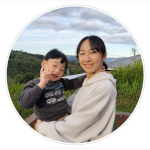
こんにちは。
夫婦でダニーデンにてICT生のStudent Supportを担当している稲葉です。今回は、妻の私、和佳子より、ダニーデンおよび生活について簡単にご紹介いたします。
私たちは定期的に学生と面談を行い、ICT生のオタゴポリテクニク留学がより充実したものとなるようサポートしています。
夫は日本のエネルギー系企業で15年間勤務した後、University of OtagoのMBA課程に留学し、今年度修了しました。家族でダニーデンの暮らしを気に入り、修了後も現地企業に就職して生活を続けています。
ダニーデンはコンパクトで、都会の喧騒もなく、かといって田舎過ぎない“ちょうどいい”街です。若い学生からは「遊ぶ場所が少ない」という声もよく聞きますが、自然に恵まれており、少し足をのばせばビーチやトレッキングコースもあるため、リフレッシュには最適です。勉強に集中できる落ち着いた環境だと思います。
4月以降、定期的にICT生とお会いしていますが、最初は新しい環境や異文化へのとまどいを感じている様子が見られました。それでも次第に適応し、自信を持って生活を楽しむ姿へと変化しており、たくましさを感じます。
次に、実際に私たちがどんな生活を送っているのか、プライベート面について紹介したいと思います。
私たちは夫、妻、子ども(長女7歳、長男5歳、次男3歳)の5人家族です。
休日には家族みんなで、公園、潮干狩り、釣り、無料のミュージアムなど様々な種類のアクティビティを楽しんでいます。ダニーデンに来る前は都内に住んでいたため、自然のスケールの大きさに圧倒されることが多いです。自宅から車で5分も走れば、遠くまで広がる牧草地で、のんびり草をはむたくさんの羊や馬、牛を見ることができます。
-
At the famous lavender field少し足を伸ばして有名なラベンダー畑へ。遠くには雄大な山並みも見えます。
-
At the beach, 10 minutes from our house. There is a sealion behind them. 家から車で10分のビーチにて。シーライオン(アシカ)によく遭遇します。
また、自宅も山を登っていく途中にあり、庭からは山の景色が見渡せます。朝は鳥のさえずりが聞こえ、昼間は日差しが降り注ぎ、お天気雨の時には虹もよく現れ、自然を常に身近に感じる環境です。
ダニーデンは春を迎え、そろそろ夏に向かう季節です。夏にはビーチで海水浴をしたり、気軽にトレッキングを楽しんだり、庭でプールなどの水遊びをしたりと、楽しみたいことがたくさんあります。ダニーデンでの生活も1年半を超え、衣食住さまざまなことに慣れ、楽しむ余裕が出てきたように感じています。

A part of the harvest昨年の収穫物の一部。採れたて野菜はやっぱりおいしいです。
最近では手作りの納豆や味噌づくりにもチャレンジしています。納豆は試行錯誤を重ね、以前より安定しておいしく作れるようになりました。味噌は仕込んだのが約半年前なので、そろそろ取り出して味を確かめる頃合いです。他にも庭で野菜を育てるなど、日本にいたら挑戦しなかったであろう様々な事柄に家族で取り組み、新たな知識と経験を得ることを楽しんでいます。
ちなみにダニーデンに来た当初は英語力ゼロだった子ども達は、この1年半で日常のコミュニケーションをほぼ問題なく英語でできるようになりました(子どもって本当にすごい!)。私(アラフォー妻)はとっくに英語力は抜かされていますが、なんとかついていきたくて、レッスンに通ったりと頑張って学んでいるところです。これからも家族みんなで、前向きにダニーデン生活を楽しみたいと思います。
この記事をご覧の皆様、ダニーデンへお越しの際はぜひお声がけくださいね。
稲葉 和佳子

Hello.
I'm Inaba, and my husband and I are in charge of Student Support for ICT students in Dunedin. This time, I, Wakako (the wife), would like to briefly introduce Dunedin and our life here.
We regularly check in with students to support ICT students in making their Otago Polytechnic study abroad experience more fulfilling.
My husband worked at a Japanese energy company for 15 years before coming to study in the MBA program at the University of Otago, which he completed this year. Our family loved life in Dunedin so much that after graduation, he found employment with a local company and we've continued living here.
Dunedin is compact, without the hustle and bustle of a big city, yet not too rural—it's a "just right" kind of town. We often hear from young students that there aren't many places for entertainment, but it's blessed with nature. With beaches and trekking courses just a short distance away, it's perfect for refreshment. I think it's a calm environment where you can really concentrate on your studies.
We've been meeting regularly with ICT students since April, and at first, we noticed they felt confused by the new environment and different culture. However, they've gradually adapted and transformed into confidently enjoying their lives, which makes us feel they're becoming quite resilient.
Next, I'd like to introduce what kind of life we actually lead from a private perspective.
We're a family of five: husband, wife, and children (eldest daughter 7 years old, eldest son 5 years old, youngest son 3 years old).
On holidays, the whole family enjoys various types of activities such as visiting parks, shellfish gathering, fishing, and free museums. Since we lived in Tokyo before coming to Dunedin, we're often overwhelmed by the scale of nature here. Just a five-minute drive from our home, we can see many sheep, horses, and cows leisurely grazing in pastures that stretch far into the distance.
-
At the famous lavender field少し足を伸ばして有名なラベンダー畑へ。遠くには雄大な山並みも見えます。
-
At the beach, 10 minutes from our house. There is a sealion behind them. 家から車で10分のビーチにて。シーライオン(アシカ)によく遭遇します。
Our home is also located partway up a mountain, and from our garden we can see the mountain scenery. In the morning we hear birds singing, during the day sunlight pours down, and when there's a sun shower, rainbows often appear—it's an environment where we constantly feel nature close by.
Dunedin is welcoming spring and moving toward summer. In summer, we have so many things we want to enjoy: swimming at the beach, casual trekking, playing with water and pools in the garden, and more. It's been over a year and a half since we started our life in Dunedin, and we've gotten used to various aspects of clothing, food, and housing, and feel we now have the capacity to enjoy it all.

A part of the harvest昨年の収穫物の一部。採れたて野菜はやっぱりおいしいです。
Recently, we've been challenging ourselves with making homemade natto (fermented soybeans) and miso. Through trial and error, we've become able to make natto more consistently and deliciously than before. As for the miso, we prepared it about half a year ago, so it's about time to take it out and taste it. We're also growing vegetables in the garden, and it's very enjoyable for the family to tackle various things together that we probably wouldn't have tried if we were still in Japan. We are gaining new knowledge and experiences.
By the way, our children, who had zero English ability when we first came to Dunedin, have reached the point where they can communicate in daily life almost without any problems in English after only a year and a half (kids are really amazing!). They have long since surpassed me (a wife in my late thirties) in English ability, but I'm trying hard to keep up by attending lessons and such.
We want to continue enjoying our Dunedin life positively as a whole family.
To everyone reading this article, please do reach out to us when you visit Dunedin!
Wakako Inaba

こんにちは、3年生の安田 萱です。ダニーデン国際空港に到着してから、もう半年が経ちました。ニュージーランドでの生活にもだんだん慣れてきて、今では毎日を楽しく過ごしています。今日は、この半年間で僕の新しい日常になった生活について紹介したいと思います。
まずはホストファミリーについてです。僕のホストファミリーは、1人暮らしの女性です。正直に言うと、ここに来る前は、家族と一緒にバーベキューをしたり、ホストブラザーと仲良くなったりして、家族の一員としていろいろなイベントを楽しむイメージを持っていました。そのため、春休みに届いたホームステイ先の情報で「2匹の犬と楽しく暮らしています!」と書かれていたときは、渡航後の生活が想像できず、不安でした。
そんな不安を抱きながら始まった2人暮らしでのホームステイですが、実際はとても良い人で、僕にぴったりな方でした。ご飯の時間や犬の散歩、買い物などをお互いのペースに合わせて行い、自由に過ごせるところがとても心地よいです。夜ご飯を食べながらの会話も、学校や勉強の話だけでなく、仕事であった面白い話やホストファミリーがハマっているスマホゲームの話など、2人暮らしならではの会話が多く、話していてとても楽しいです。また、夕食後に「アイスが食べたくなった」と言ってドライブスルーへ連れて行ってくれたり、毎週金曜日と土曜日の夜は必ずホストファミリーの友達の家で夜ご飯を楽しんだりと、家族とのホームステイではなかなか体験できない、2人暮らしならではの生活だと思います。
次は授業以外の時間に僕がどのように過ごしているかを紹介します。オタゴポリテクニクでの授業は、だいたい10時から15時ごろまでで、遅い日でも17時には終わります。授業後は、学校のすぐ近くにある大学の体育館によく遊びに行きます。体育館といっても、運動できるコートのほかに、ジムやビリヤード台、カフェもあり、さまざまなことを楽しむことができます。この施設は、僕が通うポリテクニックの学生だけでなく、オタゴ大学の学生や、会員になれば誰でも利用することができるため、大学生や社会人の方とも仲良くなることができます。
また、利用者にはニュージーランド人だけでなく、韓国やシンガポール、オーストラリア、日本など、さまざまな国から来た留学生も多く、とても楽しいです。特に日本人の留学生とは、どこか安心感があり、海外という環境だからこそ生まれる、少し特別な交流ができるのも嬉しいです。ICTの友達とバドミントンやバレーボールを楽しんでいると、自然と国籍の異なる友達が混ざってくれることもあり、また自分から声をかけて一緒にバレーボールを始めたり、サーブ練習をしたりするうちに、だんだん人が集まって試合をすることもあります。周りの人たちは留学生との交流に慣れていて、知っている日本語で話そうとしてくれたり、優しく接してくれる人ばかりなので、とても楽しい時間を過ごせています。
最近では日が長く、夜の8時を過ぎても明るいため、体育館を離れた後は友達と夜ご飯を食べに行ったり、ビーチまで走ってみたりと、放課後の時間をのびのびと楽しんでいます。
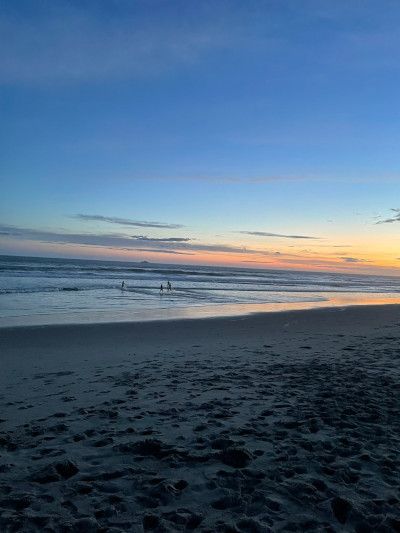
Running toward the beach at sunset 走って向かった夕暮れのビーチ
こうしてニュージーランドでの生活にもすっかり慣れ、毎日があっという間に過ぎていきます。気づけば、もうすぐ期末試験の時期です。このジャーナルでは生活面ばかり書きましたが、勉強の方も頑張っていきたいと思います。
安田 萱
 Hello, my name is Kaya Yasuda. I am a 3rd year student at ICT. It has already been six months since I arrived at Dunedin International Airport. I’ve gradually gotten used to life in New Zealand, and I’m now enjoying every day here. In this journal, I’d like to introduce what my new daily life looks like after these six months.
Hello, my name is Kaya Yasuda. I am a 3rd year student at ICT. It has already been six months since I arrived at Dunedin International Airport. I’ve gradually gotten used to life in New Zealand, and I’m now enjoying every day here. In this journal, I’d like to introduce what my new daily life looks like after these six months.
First, I’ll talk about my host family. My host family is a woman who lives with two dogs. To be honest, before coming here, I imagined a host family with parents and children. I thought we would have barbecues together and join various family events. So, when I received my homestay information during the spring holidays and read that she “lives happily with two dogs,” I couldn’t quite imagine what my life would be like and felt a little nervous.
However, once the homestay began, I realized she was a kind person and a great match for me. We do things like having meals, walking the dogs, and going shopping at our own pace, which makes living together feel very comfortable. Our dinner conversations are always enjoyable—not only about school or studying, but also about funny stories from her work or the mobile games she’s into lately. Sometimes she suddenly says, “I feel like ice cream,” and takes me to a drive-through, and every Friday and Saturday night, we go to her friend’s house for dinner. I think this kind of lifestyle, just the two of us, is something I wouldn’t have experienced in a typical host family stay, and I really enjoy it.
Next, I’d like to talk about how I spend my time outside of class. Classes here in Otago Polytechnic usually run from around 10 a.m. to 3 p.m., and even on longer days, they finish by 5 p.m. After class, I often go to the university gym located near my school. The gym isn’t just for sports—it also has a fitness area, pool tables, and even a café, so there are many ways to have fun. The facility is open not only to students from the polytechnic I attend but also to students from the University of Otago, and anyone can use it if they become a member. Because of that, I’ve been able to make friends with people my age, university students, and even working adults.
There are also many international students who use the gym, from countries such as Korea, Singapore, Australia, and Japan. It’s always fun meeting new people. Especially when I meet Japanese students, there’s a special sense of comfort—a feeling of connection that’s a bit different from other friendships. While I often play badminton and volleyball with my ICT classmates, sometimes students from other countries join in naturally. Other times, I start by asking them to help me practice setting or serving. Before we know it, more people gather, and we end up having a small match. Everyone is very open and friendly, and many try to speak the simple Japanese they know. It’s always a fun and warm atmosphere.
Recently, the days have become much longer, and it stays bright even after 8 p.m. After leaving the gym, I often go out for dinner with friends or take a run to the beach. I really enjoy spending my evenings freely and actively.

Running toward the beach at sunset 走って向かった夕暮れのビーチ
I’ve now completely settled into life in New Zealand, and the days are flying by. Since the term is almost over and exams are coming up soon, I’d like to focus on studying hard as well.
Kaya Yasuda









